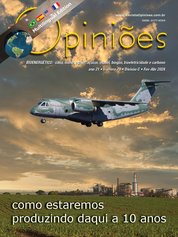Ricardo Busato Carvalho
Diretor Comercial e de Originação de Cana-de-açúcar na BP Bunge Bioenergia
OpAA79
Brasil e o SAF: nosso potencial vai além da matéria-prima
As políticas relacionadas à descarbonização do transporte aéreo estão no centro dos debates mundiais sobre a questão da transição energética. Afinal, estamos falando de uma atividade responsável por cerca de 3% das emissões globais dos Gases de Efeito Estufa - GEE, na atmosfera, segundo dados da Organização da Aviação Civil Internacional – ICAO (International Civil Aviation Organization, do inglês).
Em novembro passado, governos de mais de 100 países membros da ICAO definiram como meta a redução de 5% da intensidade de carbono do combustível utilizado nas aeronaves até 2030. Um compromisso que só poderá ser viabilizado a partir do avanço significativo na agenda de desenvolvimento de novas fontes de energia limpa.
Em novembro passado, governos de mais de 100 países membros da ICAO definiram como meta a redução de 5% da intensidade de carbono do combustível utilizado nas aeronaves até 2030. Um compromisso que só poderá ser viabilizado a partir do avanço significativo na agenda de desenvolvimento de novas fontes de energia limpa.
São essas fontes que poderão substituir os combustíveis fósseis na operação desse modal, como o Combustível Sustentável de Aviação, na sigla em inglês SAF (Sustainable Aviation Fuels).
O insumo pode ser produzido a partir de várias matérias-primas, dentre as quais se destaca o etanol ? o que faz com que sua pegada de carbono seja até 80% menor em relação ao similar de querosene, de acordo com a IATA – Associação Internacional de Transporte Aéreo.
Nesse cenário, o Brasil, que ocupa o posto de segundo maior produtor e exportador mundial de etanol, e cuja matriz energética se destaca pelas fontes prioritariamente renováveis e limpas, está diante de uma oportunidade única de figurar entre os protagonistas do processo que guiará o mundo rumo à transição para uma aviação mais sustentável.
O setor brasileiro já está, inclusive, se estruturando para atuar no fornecimento do etanol como matéria-prima para a produção de SAF em plantas construídas no exterior para esse tipo de operação (por enquanto, apenas nos Estados Unidos).
Na BP Bunge Bioenergia, por exemplo, recebemos em 2023 a certificação ISCC CORSIA (Carbon Offsetting and Reduction Scheme for International Aviation), que confirma que o etanol produzido pela empresa está, segundo os padrões internacionais, determinados para a produção desse biocombustível.
Temos potencial no país para ir muito além da matéria-prima. Enxergo o Brasil como um produtor local desse novo combustível sustentável de aviação, uma vez que não há justificativa para exportar o nosso etanol e importar o SAF produzido a partir dele.
Para isso, entretanto, assim como acontece nos Estados Unidos e no Japão ? dois países que atualmente despontam no desenvolvimento dessa indústria ? faz-se fundamental a implementação de políticas e incentivos que respaldem esse processo.
Alguns passos iniciais já foram dados nesse sentido. No projeto de lei “Combustível para o Futuro” (PL 4.516/2023) foi instituído o Programa Nacional de Combustível Sustentável de Aviação (ProBioQAV), visando incentivar a pesquisa, a produção, a comercialização e o uso energético do SAF no Brasil.
O programa determina que os operadores aéreos ficarão obrigados a reduzir as emissões de gases de efeito estufa em suas operações domésticas por meio da utilização de SAF em, no mínimo, 1% entre 2027 e 2028.
A partir de então, esse percentual sobe 1 ponto a cada ano, até chegar a um compromisso de corte das emissões de 10% em 2037. Entendo que tais determinações foram importantes para o Brasil marcar uma posição referente ao tema. Apesar de ainda não estarmos tão avançados quanto outros países na perspectiva de produção de SAF, penso que podemos surpreender na velocidade com que as coisas devem evoluir, caso a legislação e as metas amadureçam, haja vista nossa matriz de distribuição de etanol gigantesca. Temos aqui o maior programa de mistura de biocombustíveis do planeta. Etanol não é uma novidade para nós!
No entanto, para nos posicionarmos para além da condição de exportadores de matéria-prima, em um cenário relacionado ao SAF, precisamos de investimentos, políticas públicas e incentivos que ajudem a alcançar uma posição de maior destaque como produtores. Como setor e indústria, precisamos investir em tecnologias avançadas e na otimização dos processos, a fim de garantir eficiência e competitividade. Com isso, também aumentamos o volume de produção, colaborando para suscitar uma priorização desse assunto junto às esferas públicas. Ainda, a colaboração entre governo, indústria e sociedade civil é crucial para garantir que esse caminho seja desbravado com aproveitamento de todo o seu potencial.
Historicamente, o Brasil tem sido um exportador de commodities e, embora isso represente uma parte significativa de nossa economia, é imperativo explorar alternativas que nos levem a outros patamares. A aviação sustentável oferece uma via promissora nesse sentido, permitindo-nos não apenas fornecer insumos, mas, também, produtos acabados que impulsionam a transição global para um planeta mais verde.
Ao investir em SAF e outras alternativas de combustíveis renováveis, podemos não apenas nos destacar como produtores, mas, também, como pioneiros em inovação ambiental. Políticas estratégicas e parcerias colaborativas são essenciais para alcançar esse objetivo ambicioso. Na medida em que nos lançamos em direção a um futuro mais verde, o Brasil tem a oportunidade de deixar uma marca duradoura na aviação global. Que essa visão audaciosa seja a alavanca para um futuro mais sustentável e próspero para todos.




